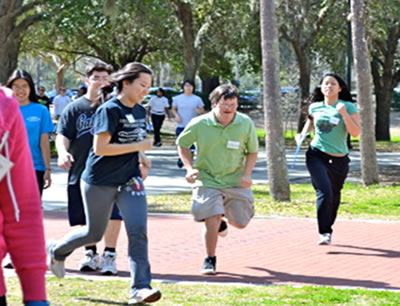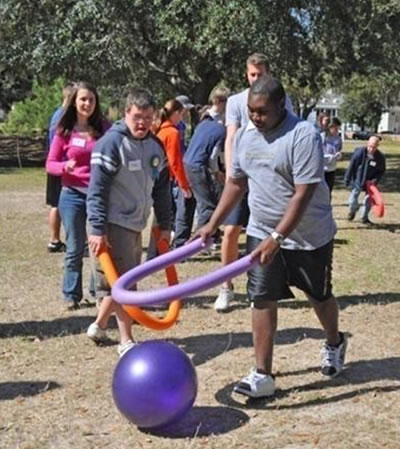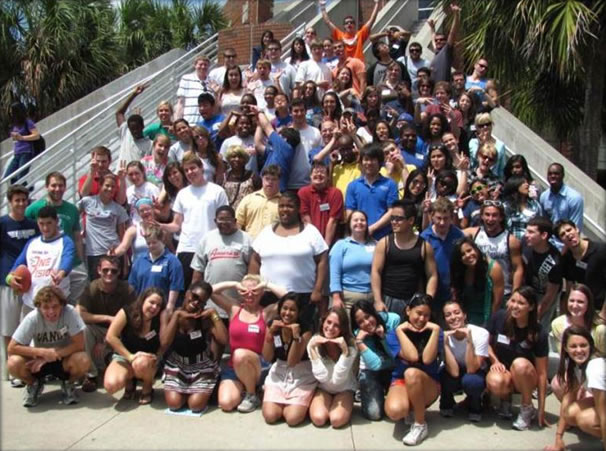Physical Activity's Effect on
the Cognitive Abilities of Young Adults with Intellectual
Disabilities
This is a summary of the JSCR
article,
written by Alyxandra Aldrich1,
Victoria Claypoole2,
Robert Pastula3,
Christine Stopka3,
Chris J. Hass3,
Anthony Delisle3,
Ann Goodman4
University of Florida, College of Public Health & Health
Professions1
University of Florida, College of Liberal Arts & Sciences2
University of Florida, College of Health and Human Performance3
Sidney Lanier School, Alachua County Public Schools 4
ABSTRACT
Individuals with intellectual disabilities (ID) are more likely
to struggle with independence, have social dilemmas, and experience
health obstacles when compared to individuals without disabilities.
Many studies propose that exercise could be a way to enhance
cognitive abilities; however, few of these studies consider
populations with disabilities.
In the initial pilot study, 14 young
adults (ages 17-21) with ID attended a community based exercise
program for 8 weeks. The young adults were pre and post-tested
using 3 subtests of the Woodcock Johnson III Test of Cognitive
Abilities to explore their cognitive functioning levels. Results
determined that scores on all three cognitive abilities tests
improved significantly following the 8 week intervention (all,
p=0.002). In conclusion, an organized exercise program may
enhance cognitive abilities among young adults with ID.
INTRODUCTION
There are an estimated 4.6 million individuals in the U.S.
with an intellectual or developmental disability (AAID, 2012).
An individual with an intellectual or developmental disability
is diagnosed before the age of 18, and has significant limitations
in both intellectual functioning and adaptive behavior, such
as conceptual skills, social skills, or practical skills.
Quite a few of these individuals are young adults struggling
to transition from school into the work force and independent
living.
Current interventions to aid in this
transition are repetitive and not entirely beneficial for
these individuals (Hessels, 2012). We propose that exercise
could be an alternative intervention. Individuals with Intellectual
Disabilities (ID) could gain vocational opportunities and
independence through improvement of cognitive functioning.
There is evidence that physical activity has a positive effect
on cognitive ability, but most of the evidence-based studies
concern individuals without disabilities (Hillman, 2008).
However, adults with ID are less likely
to be physically active than those without ID (Bartlo, 2011).
We hypothesize that not only can physical activity improve
the overall physical health for these young adults with ID,
but can also improve their cognitive processes, and thus assist
in life transitions.
METHODS
Participants: 14
participants from a specialized school for students with ID
participated in the study (including Down syndrome, autism
spectrum disorder, etc.). Each individual was classified with
a mild to moderate ID based on testing prior to the intervention.
The average age of participants was 19.4 (+ 1.3), and included
nine males and five females. Students were selected to participate
in exercise program based upon seniority, good behavior, good
standing of health, and signed consent form from both parent/guardian
and physician.
Exercise Intervention:
The community-based exercise program was held at the University
of Florida. The exercise program lasted eight weeks, and met
twice a week for 50 minutes each day. The physical activity
done during the program consisted of a mix between own body
weight exercises (static planks, squats, etc.) and adaptive
recreational sports (including obstacle courses, noodle soccer,
etc.). Student's heart rates were checked periodically throughout
program to ensure a moderate intensity (60-70% of max heart
rate) work-out was being maintained. The cognitive measurements
were taken the week before the intervention began and the
week following the intervention's completion.
Measurement of Cognitive Ability:
Woodcock
Johnson III Test of Cognitive Abilities - The three subtests
used in this were combined into a standard score of Processing
Speed, or the speed of mental activity. For each subtest the
participants were given 3 minutes to complete as many questions
as possible.
Pair Matching (60 questions):
This measures ability of perceptual speed which
involves making comparisons based on rapid visual searches.
Decision Speed (40 questions):
This measures the speed of semantic processing (manipulation
of stimulus content) and requires one to make symbolic comparisons
of concepts.
Pair Cancellation (21 rows
of figures): This measures persistent attention
on a cue and target. Attention and ability to focus on stimulus
is an important aspect of cognitive activity.
See Figures 1-2.
RESULTS:
After pre-testing, and prior to the start of the intervention,
2 participants were excluded from the study due to problematic
behavior at school; the remaining 14 participants completed
the entire 10 week exercise program along with pre- and post-testing.
The sample mean exercise heart rate during the intervention
was 138 beats per minute (68% average max heart rate), confirming
that the participants worked within the range of 60-70% of
their predicted max heart rate. Performance was significantly
improved on all 3 cognitive tests (all, p < 0.002). The
mean percent increase in processing speed, a measure taking
into account each individual's performance on the 3 subtests,
was 103%. Individual and group performance on all three subtests
can be found in Table
1.
DISCUSSION
Due to the heightened prevalence of inactivity and health
problems among people with disabilities, it is important to
convey the positive outcomes that physical activity can encourage.
This study proposes that a moderate intensity, community based
exercise program may improve the cognitive abilities of young
adults with ID.
Because of the moderate intensity
and fun nature of the exercise program, all of the participants
adhered to the 8 week intervention. However, sustaining a
physically active lifestyle is very difficult for individuals
with ID because of many barriers (including transportation,
self efficacy, etc.) (Bodde, 2009). Encouraging physical activity
and enhancing cognitive functioning is essential for individuals
with ID because it could help in their struggle for independence,
community involvement, and overall life satisfaction.
CONCLUSION
Moderate-intensity exercise training can yield robust improvements
in the cognitive functioning and aerobic fitness of young
adults with intellectual disorders. These effects support
the inclusion of exercise programs into the lives of young
adults with intellectual disorders to promote their physical
and cognitive health. The individuals of this study exercised
at a moderate intensity and were able to reap significant
benefits in cognition.
It is clear that exercise is beneficial
for both physical and mental health, but the greatest challenge
to youth with disabilities is finding ways for them to enjoy
and adhere to a physically active lifestyle (Rimmer, JA and
Rowland, JL, 2008). While the participants in this study could
either stay in their classrooms, or choose to attend the exercise
sessions, we observed a 100% adherence rate. This is likely
due to the moderate intensity and enjoyable nature of our
group exercise intervention.
Increasingly, persons with intellectual
disorders are searching for independence, but low graduation
and employment rates remain a hindrance to their success.
An effective exercise therapy may catalyze their integration
into society (Stopka, et al., 2008), while also significantly
lowering their health care costs.
FUTURE RESEARCH:
Further research is needed to expand beyond this pilot study.
Two replicate studies have already been completed, data are
being analyzed, and preliminary findings show similar improvements
in cognitive abilities. Larger studies are indicated, along
with a qualitative analysis of the exercise intervention to
reveal the participants' feelings and views towards the program
(including sustainability, level of enjoyment, improvement
possibilities).
ACKNOWLEDGMENTS
Special thanks is given to the Sidney Lanier School
for their support, and for providing transportation to the
University of Florida from Sidney Lanier. We would also like
to thank Dr. Marcia Wiesel-Leery for providing the training
for the cognitive testing and allowing us to use her resources.
Also, we would like to thank the Stephen C. O'Connell Center
staff for allowing us to use all of their facilities for the
entirety of the ten week program.
references
This article is a summary
of the FULL article. To find out more, read the full
article.
PHOTOS
Exercising hard, everyone participates together in this
wonderful inclusive fitness program.

Our favorite game - noodle soccer. Everyone has a ball (literally)
and a noodle. Goals are on all 4 sidelines. It’s maximum
participation and fun for all!

Group "Silly" picture showing how well the students
from UF and the students from Sidney Lanier get along so well!

(back
to pelinks4u homepage) |






